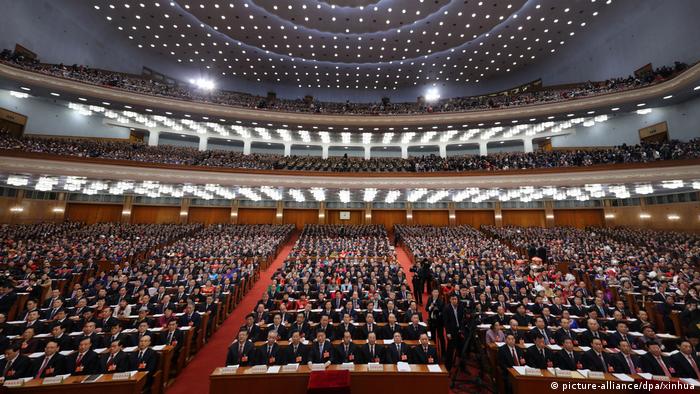Beijing wants to treat foreign companies equally in the future. The hot needle knitted new law, however, is mainly a symbolic gesture in the direction of Washington, writes Frank Sieren.

2.929 delegates of the people’s Congress voted for the law on Investment, eight against, and eight abstained
The “act on investment by foreign companies” is the fastest-adopted act in the history of the people’s Republic: Only three months it took from design to adoption last week when the National people’s Congress in Beijing. From the first of January 2020 is to change fundamentally how foreign companies in China are treated. You should be able to act from then on, to the same conditions as domestic companies in the market, such as access to capital or public tenders. The theft of intellectual property should be more punished, and technology transfer to local Joint Ventures a thing of the past, as is the “illegal interference of the government” in foreign operations. The passing on of company secrets would be strictly punished, said Premier Li Keqiang in his closing speech before the people’s Congress at the Great hall of the people. The state must protect “copyrights,” and ensure that foreign companies “at a disadvantage”. Actually, as a matter of course.
That everything went so quickly, and also the highest point so clearly communicates, is mainly due to the trade dispute with the United States. The government wants to prove that she is ready to Washington’s demands.
This is also in our interest. Just last week Brussels announced in a joint statement that they should not be permitted to treat China as a “developing country” but as a “leading technological Power” and “strategic competitor”, the international trade laws unilaterally for themselves to exploit, and at the same time its markets closed.
Stability must be Beijing’s target
In fact, many of the economic laws of China, from the first Phase of the Opening between 1979 and 1989. The gap between the Poor and the rich is in the giant country, however, still immense. And also in Per capita income, China has not yet opened long ago to the rich industrial countries. In order not to endanger the own rise, Beijing must worry about now, especially for stability. The economy is under pressure. The economic expectations were for the first time, screwed for three decades to between 6 and 6.5 percent. The is still much. The trade dispute has, however, unsettled many business owners and consumers. “It is true that the Chinese economy is printing under a new downward,” said Li at a press conference at the conclusion of the people’s Congress. “We need to take strong measures.”

DW-columnist Frank Sieren
Whether the said Reform for foreign companies will really lead to a fair and free market, is uncertain. Old agreements need to be renegotiated. Beijing reserves the right to a transitional period of five years to implement the new law. In five years a lot can happen. And Beijing has promised much. A first draft with 170 articles was already available in 2015. The new Version of 42 articles, is now significantly shorter. This must not necessarily be a Bad thing. But: To say, it went too fast.
Vague and ambiguous formulations in the law
The chambers of Commerce of the EU and the US criticise that it had not been time for any suggestions or comments. Many of the formulations are vague and ambiguous. This is not helped “to strengthen the trust and confidence in the basically desired good goal – the promotion of a transparent and fair legal framework for foreign investment,” said Jens Hildebrandt, managing Director of the German chamber of foreign trade in Beijing. Until a Plan is published with specific points in time, the economic reform, therefore, is little more than a symbolic gesture.
Watch the Video 01:26 Share
More openness in China
Facebook Twitter google+ send Tumblr VZ Xing Newsvine Digg
Permalink https://p.dw.com/p/3F8WL
China’s people’s Congress approves new investment law
The China-EU summit on the ninth day of April, Li Keqiang, European Commission President Jean-Claude Juncker and EU Council President Donald Tusk to participate, it should also be about specific deadlines. The United States even want to introduce a series of measures that China has guaranteed that in the agreements. Therefore, it should be presented in regular Meetings with complaints about unequal treatment. Every three months, the Vice-Ministers on both sides to come together and every half a year to the Minister. In the case of unsolvable problems America will take “unilateral” actions, such as new criminal duties. This idea has been one of the hurdles in the negotiations to resolve the trade dispute. Also still open is how to Beijing with the so-called negative list, the procedure wants. The are not allowed to invest in areas where non-nationals. Li promised, “more areas to open so far” – that the Communist party is a foreign company uncontrolled in areas such as the Chinese media industry or the capital market to penetrate, but it is more than unlikely.
Stays true with all will to Reform, is that the influence of the party state and party chief Xi Jinping will be expanded within the economy. That China will change its direction to fundamental or even to the liberal market economy is, is and wishful thinking. We have to decide to what extent we can with these contradictions of life. To avoid business with China’s state capitalism, we can no longer afford a long time ago.
Our columnist Frank Sieren has lived for over twenty years in Beijing.

